PEOPLE’S PARLIAMENT DISPUTE
Eswatini democracy activists reject Sibaya dialogue to be chaired by Mswati III
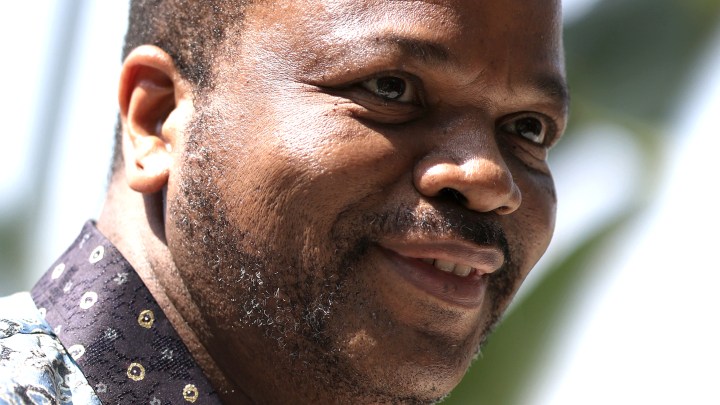
Activists calling for political reforms in Eswatini have rejected a national dialogue that the government says will be held under the framework of traditional laws and structures. It is scheduled for next Monday, 23 October 2023.
‘We look forward to the Sibaya national dialogue that has been called by His Majesty King Mswati III […],” reads a statement by Eswatini government spokesperson Alpheous Nxumalo.
Early this year, the government announced a 30 million emalangeni (R30-million) budget for the dialogue. Nxumalo’s statement was vague on the modality of the dialogue. He also did not say if the dialogue would be inclusive.
It was King Mswati who pronounced, when dissolving parliament on 11 July 2023, that there would be a “Sibaya National dialogue” after the September elections.
Read more in the Daily Maverick: To contest or boycott? Eswatini election divides pro-democracy activists
According to the Eswatini constitution, Sibaya “constitutes the highest policy and advisory council of the nation”.
“The Sibaya is the Swazi National Council constituted by Bantfwabenkhosi (Princes and Princesses), the tikhulu (Chiefs) of the realm and all adult citizens gathered at the official residence of the Ndlovukazi (Queen Mother) under the chairmanship of iNgwenyama (King) who may delegate this function to any official,” it reads.
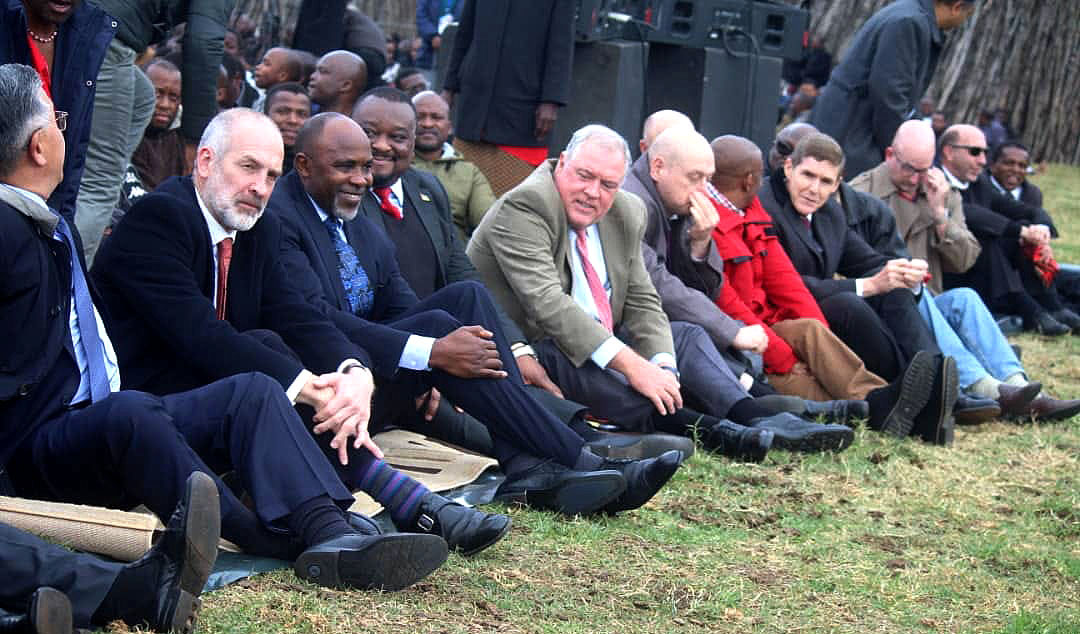
Diplomats, including the UK and US ambassadors, follow proceedings at the last Sibaya on 11 July 2023 at Ludzidzini Palace (Photo: Eswatini Government)
During Sibaya, emaSwati gather at a large cattle byre within the queen mother’s residence at Ludzidzini Palace, about 20km south of the capital Mbabane. At Sibaya, the king usually makes important pronouncements such as the appointment of a prime minister and the dissolution of parliament.
Sometimes the king allows the people to voice their concerns and make submissions on social, political and economic issues. Such deliberations are known as “the people’s parliament”.
However, activists and political formations have for years refused to accept the Sibaya dialogue as a platform to deliberate on the political matters. They contend that it gives the monarch an upper hand in the sense that, as per the constitution, the monarch is chairperson of Sibaya.
The Multi-Stakeholder Forum (MSF), which comprises civil society and political formations, told Daily Maverick that it will not participate.
“It is crucial to highlight that there have been no legal changes to the constitution, character or authority of Sibaya since the last one, which unfortunately did not result in meaningful engagement with the citizens. Sibaya is not the appropriate platform for the type of dialogue we are advocating for,” said MSF spokesperson Sivumelwano Nyembe.
As we speak, none of us know the reason or even the agenda of the announced Sibaya. That means most attendees will go there unprepared.
The MSF had been calling for “an internationally mediated dialogue” whose primary goal would be reforming the current political system and ushering in a new constitution that guarantees multiparty democracy.
Nyembe added: “We anticipate that the government will honour the Southern African Development Community resolution and establish an all-encompassing political dialogue process that acknowledges the role of people’s organisations. History has shown that an individualistic approach has proven ineffective in achieving lasting peace and meaningful democratic changes.”
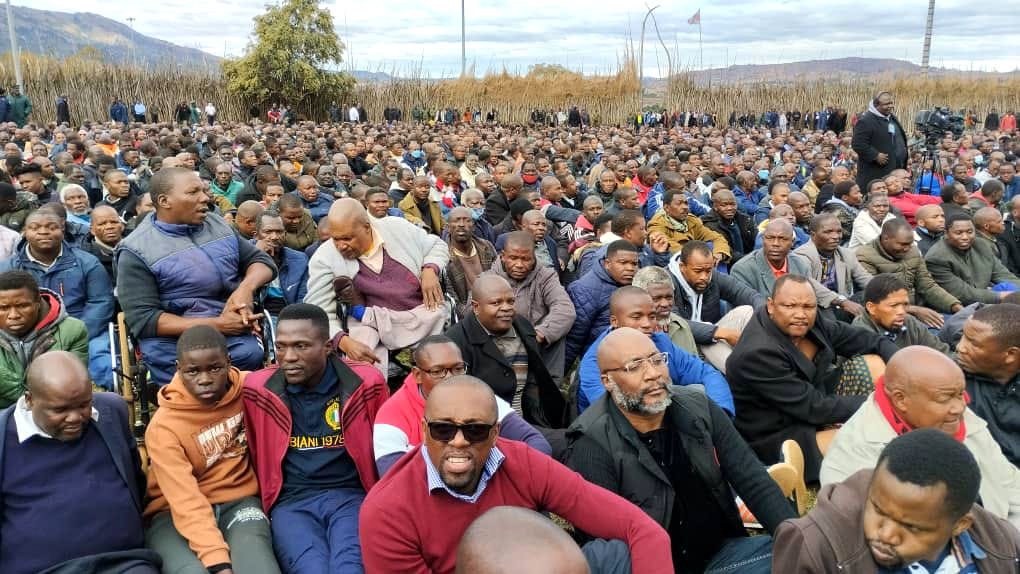
People listen to King Mswati at the last Sibaya on 11 July 2023 (Photo: Eswatini Government)
Only the king speaks
During the last Sibaya on 11 July 2023 only the king spoke and none of the people in attendance was afforded an opportunity to make submissions or respond to what the monarch had said.
Similarly, during Sibaya in July 2021, held in the aftermath of pro-democracy protests that were violently suppressed, only King Mswati addressed the gathering. Then he lambasted pro-democracy activists, calling them dagga smokers.
Read more in Daily Maverick: King Mswati ignores calls for change in first response to Eswatini crisis
The last Sibaya where ordinary people were afforded a chance to make submissions was in 2018.
Mlungisi Makhanya, the president of the banned People’s United Democratic Movement, told Daily Maverick that they would not take part in Sibaya unless the deliberations are held in a conducive environment, where there would be a prior agreed agenda and a distribution of minutes after the deliberations. Makhanya was speaking in his capacity as chairperson of the Political Parties Assembly, which is made up of political formations in Eswatini.
“The constitution says Sibaya is the Swazi National Council, and is the highest policy and advisory council of the nation. We hold a view that says the ‘advisory’ should be removed and replaced with ‘decision’. This will ensure that decisions taken at the Sibaya are not reviewable by any other traditional institutions,” Makhanya said.
He stressed that no meaningful dialogue can ever take place at Sibaya in its current form.
“As we speak, none of us know the reason or even the agenda of the announced Sibaya. That means most attendees will go there unprepared, without any meaningful mandate from their respective constituencies and with no knowledge of the rules of engagement,” he added.
The king has always said he would embrace constitutional transformation away from hooliganism and terrorism in which power sharks torch businesses, rob and kill the same people they claim to be liberating.
Makhanya agrees with other activists who believe that a proper dialogue can only take place if mediated by an independent body or individual.
The Swaziland Liberation Movement (Swalimo), a party formed by exiled former MP Mduduzi Simelane, also does not believe in the institution of Sibaya as a proper platform for deliberations on Eswatini political matters. Spokesperson Thandaza Silolo said they can only participate in a dialogue with clear terms of reference agreed to by all stakeholders.
“Swalimo maintains the collaborative position [of] the Mass Democratic Movement that calls for an inclusive and meaningful political dialogue, the unbanning of political parties and release of political prisoners prior to the dialogue,” Silolo said.
The king’s spokesperson, Percy Simelane, told Daily Maverick that Sibaya has been held for decades and, in most instances, after the elections. The deliberations usually lasted a week and ended with the king appointing the next prime minister, as provided for in the constitution. “Those who will not participate will be exercising their constitutional right to do so. You don’t run a country on individual opinions on the street, but on its constitution. Sibaya is constitutional.”
Asked whether the monarch would agree to political reforms if the people at Sibaya demanded a complete overhaul of the political system, Simelane said Mswati has never been opposed to political reforms: “The king has always said he would embrace constitutional transformation away from hooliganism and terrorism in which power sharks torch businesses, rob and kill the same people they claim to be liberating.”
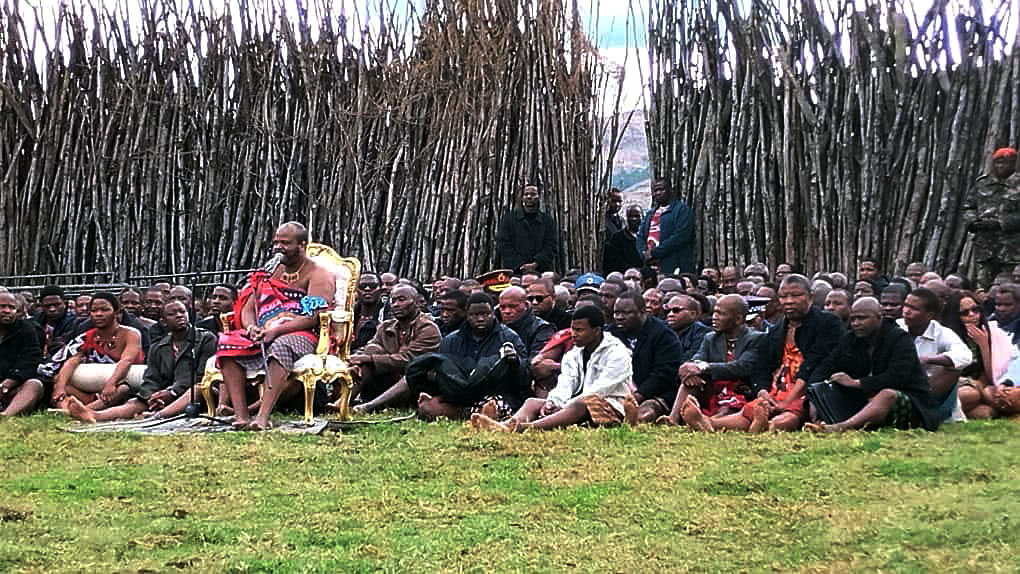
King Mswati III speaks at the Sibaya where he dissolved parliament on 11 July 2023 (Photo: Eswatini Government)
SADC recommends inclusive dialogue
In its preliminary report released after the 29 September parliamentary elections, the Southern African Development Community’s (SADC) Electoral Observer Mission recommended that Eswatini hold an all-inclusive national dialogue “to give the people of Eswatini an opportunity to explore options for their political system”.
Read more in the Daily Maverick: Eswatini faces perilous future under Mswati despite elections monitoring thumbs-up from AU, SADC
Led by former Zambian vice-president Enoch Kavindele, the mission also urged Eswatini authorities to allow political parties to participate in the elections.
“The mission reiterates that the government and citizens of the kingdom conduct peaceful and inclusive dialogue with respect to the organisation of the political system, in particular, the recognition of the role of political parties in the context of the Tinkhundla system [the system of governance currently used in Eswatini],” reads the report. It further implores the authorities and the relevant stakeholders to ensure that the national dialogue subscribes to “the SADC values and norms as enshrined in the Principles and Guidelines Governing Democratic Elections”.
“The dialogue should give full effect to section 25 of the [Eswatini] constitution,” it reads. Section 25 of the constitution of 2005 protects the right to freedom of assembly and association. Human rights defenders and constitutional law experts have argued that this section, in effect, nullifies the 1973 decree which banned political parties and criminalised gatherings for political purposes. However, the decree is technically still in effect since most political parties are banned while others are not registered.
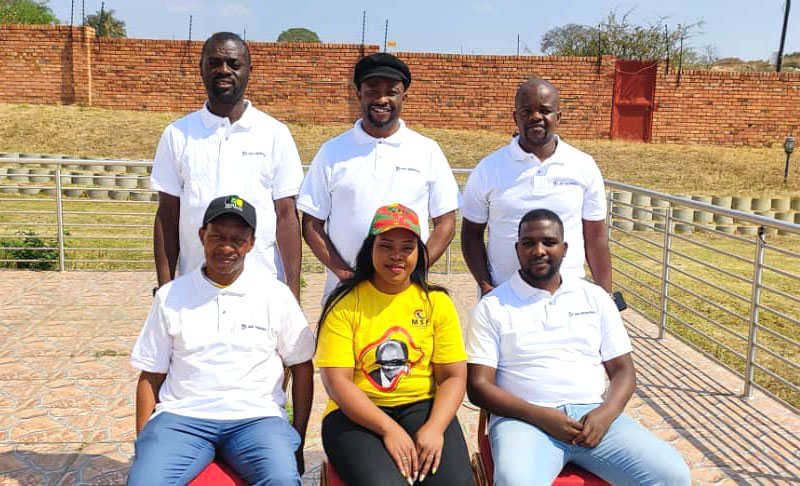
Representatives of Eswatini political parties affiliated to the Political Party Assembly, an organisation of political formations advocating for political reforms in Eswatini. (Photo: Swaziland Multi-Stakeholder Forum)
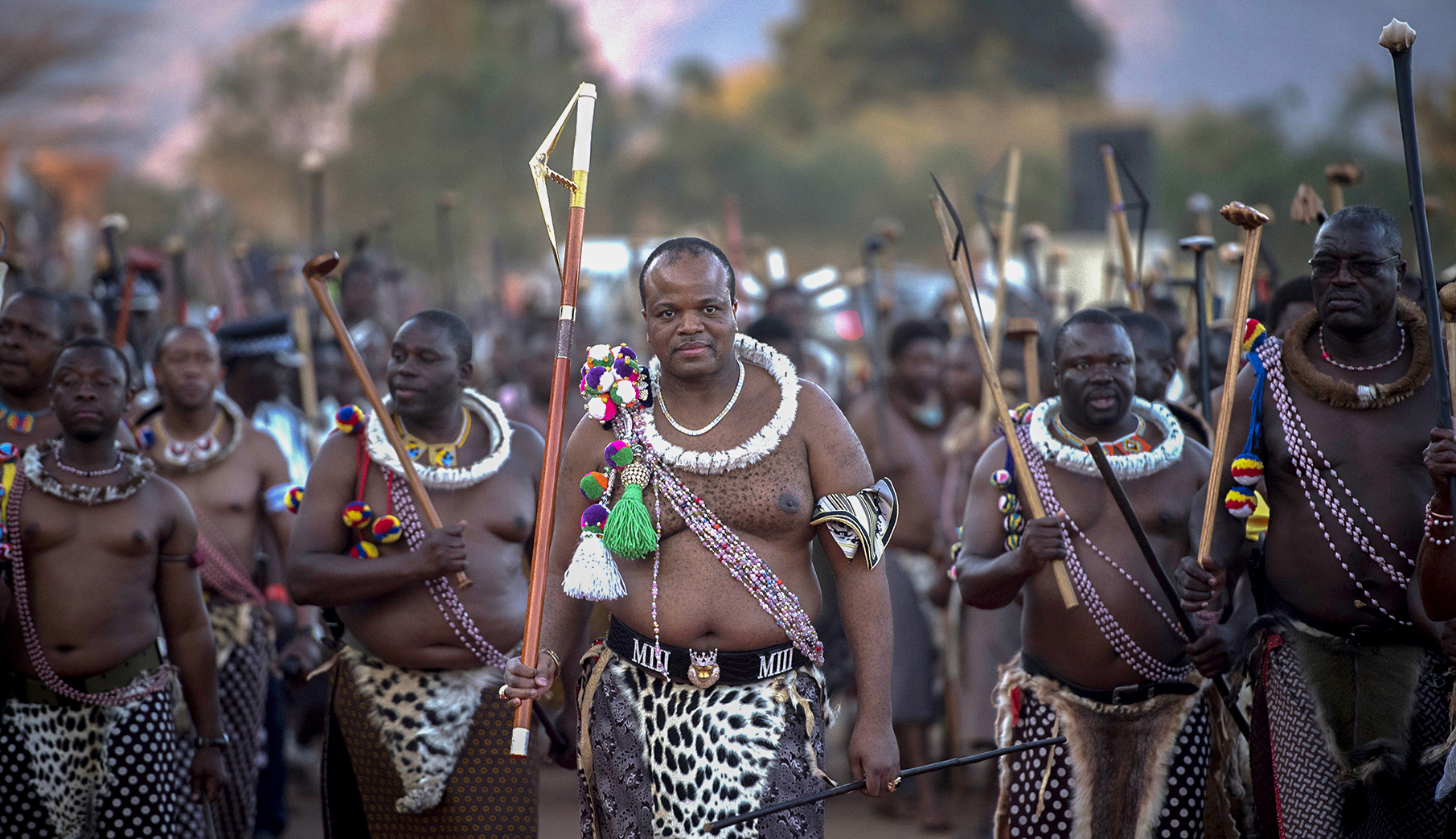
Swazi King Mswati III arrives at the annual Reed Dance ceremony in Manzini on 28 August 2016. The ceremony is a cultural event and right of passage for maidens to reach adulthood. The maidens cut reeds over the weeks before the event and present them to the king. (Photo: EPA / Shiraaz Mohamed)
Eswatini has no legislative framework enabling political parties to contest for political positions. Members of political parties can only contest parliamentary elections as independents. However, upon being elected into the legislature they can only advance the mandate of their constituencies, not that of their political parties.
The SADC Electoral Observer Mission said in its report that it had been informed by “stakeholders in government and others” that the national dialogue would indeed take place after the elections to deliberate on “this critical structural issue [Eswatini political impasse]”.
In a statement the Eswatini government noted the recommendations by the SADC and the other election observers from the AU, the Commonwealth and the Russian Federation. Nxumalo, the spokesperson, further expressed gratitude to all diplomatic and development partners who ensured that the recent parliamentary elections were “a resounding success”.
The 59 elected legislators, including the 10 MPs appointed by Mswati, have already been sworn in. The king is expected to appoint a new prime minister at the conclusion of Sibaya, which begins on Monday, 23 October 2023. Since 1967, all Eswatini prime ministers have come from the ruling Dlamini clan. DM



















 Become an Insider
Become an Insider
Comments - Please login in order to comment.